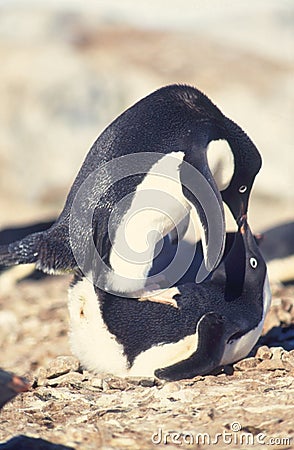Natural History Museum at Tring:
Autoerotic behaviour, necrophilia, sexual coercion, sexual and physical abuse of chicks, non-procreative sex and homosexual behaviour. As an Edwardian scientist, Levick couldn't help but interpret the behaviour he saw in human moral terms. He was so shocked by what he saw he even wrote in Greek to disguise the information. 'There seems to be no crime too low for these penguins,' he wrote.

Dr George Levick was a surgeon and the medical officer on the famous 1910-1913 British Antarctic Expedition, Terra Nova, led by Captain Scott. He studied the penguins at Cape Adare, which has the largest Adélie penguin colony in the world. Levick's observations of sexual behaviour, too graphic for their time, weren't published with the other Terra Nova expedition reports. One hundred copies of Levick's 4-page pamphlet were printed but only 2 are known to still exist. The pamphlet lay hidden in the bird collections at the Natural History Museum at Tring and was only recently uncovered.
Dr. George Murray Levick (1876–1956): unpublished notes on the sexual habits of the Adélie penguin
Douglas G.D. Russell,
William J.L. Sladen
and David G. Ainley
Polar Record, http://journals.cambridge.org/action/displayAbstract?aid=8594320
Polar Record, http://journals.cambridge.org/action/displayAbstract?aid=8594320
A lot has changed in the study of natural history since Levick's time, resulting in a much better understanding of animal behaviour. Same-sex sexual behaviour has now been documented in many animals including mallards, European swallows, and sand martins.
Today, it is understood that acts like necrophilia are not the same in penguins as in humans. Penguins are chemically wired to respond to a seemingly compliant female of breeding age, rather than being sexually aroused.
'Penguin research has come a long way since Levick's day,' says Ainley. 'These days we're not so much concerned with hooligans and the follies of young penguins, but rather the fact that only about 15% of the breeders consistently raise young.'
He says that the remaining 'hooligan' birds are little more than 'background noise' when seasonal changes bring challenges to raising chicks. It is 'super breeders' that determine whether or not the penguins as a whole cope with these changes.
'These ''super breeders'', as we call them, are great athletes. Compared to the ''rabble'', they dive deeper, more often (they have a shorter recovery between dives), have shorter foraging trips, and bring back larger food loads to their young.
'We're trying to figure out what is behind their ability,' adds Ainley. 'Is it learned or inherited?'


No comments:
Post a Comment